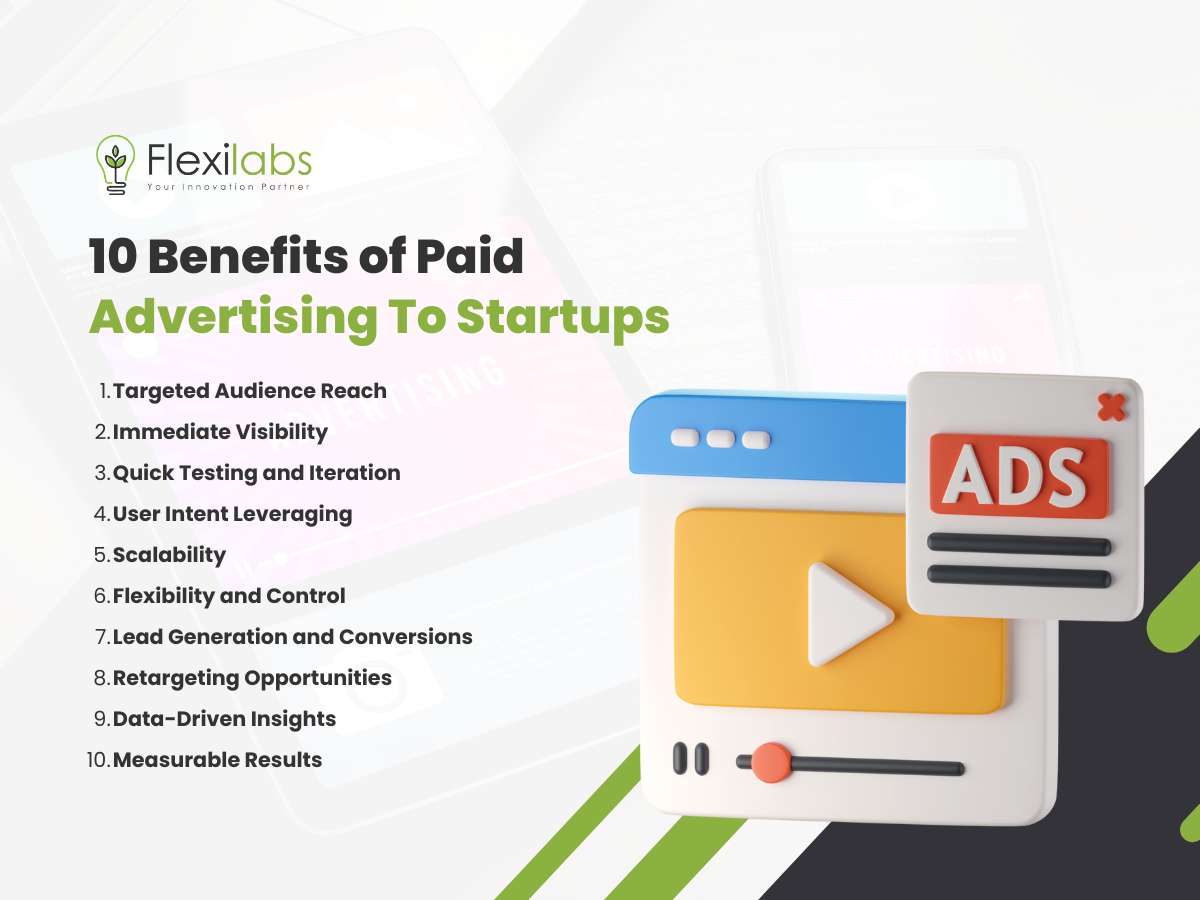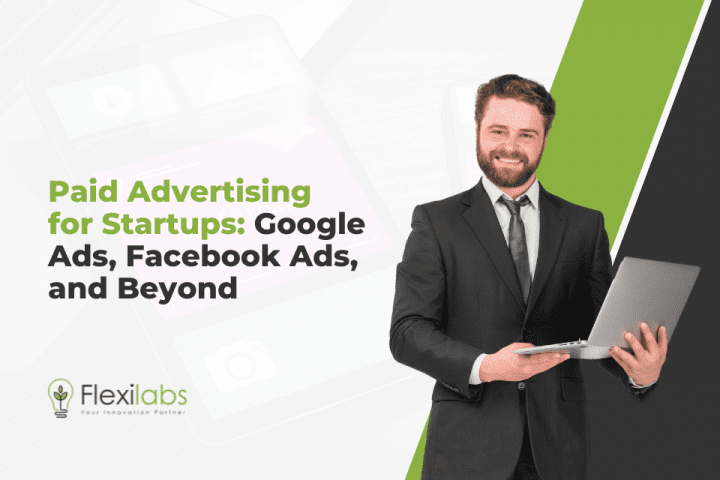In today’s competitive business landscape, startups face numerous challenges in gaining visibility and attracting customers. While organic growth strategies are essential, paid advertising can boost a startup’s visibility and customer acquisition efforts. And yet, only 45% of small businesses invest in PPC.
This article delves into paid advertising for startups, exploring the benefits of Google Ads and Facebook Ads while considering alternative platforms and strategies that startups can leverage.
What is paid advertising?
Paid advertising, or pay-per-click (PPC) advertising or online advertising, refers to a digital marketing strategy in which businesses pay to display their advertisements on various online platforms. These platforms can include search engines, social media networks, websites, and other digital spaces where users spend their time. The main concept behind paid advertising is that businesses pay a fee each time their ad is clicked or shown to users, depending on the advertising model used.
Likewise, paid advertising is a dynamic and constantly evolving field within digital marketing. It allows businesses to achieve specific goals, whether increasing brand awareness, driving website traffic, generating leads, or boosting sales.
How can Paid Advertising help startups?
Paid advertising offers startups a unique opportunity that can help accelerate their growth and increase revenue. It helps them reach their target audience by showcasing their products or services to potential customers actively searching for relevant solutions.
Likewise, here are some key benefits of paid advertising for startups.
- Reach targeted and specific audiences. Most ad platforms allow users to define their audience based on demographics, interests, behaviors, etc. This precision ensures that the startup company’s ads are shown to individuals most likely interested in their products or services.
- Gain immediate visibility. Startups can place their ads in front of potential customers as soon as their campaigns go live, allowing them to generate traffic and lead immediately.
- Establish branding in a competitive market. Consistent exposure through paid advertising for startups helps increase brand recognition and recall among the target audience, improving trust and credibility.
- Have flexible and complete control. This flexibility allows startups to optimise their strategies for maximum effectiveness.
- Easily measure results. Metrics such as clicks, impressions, click-through rates, conversion rates, and more allow startups to track their return on investment (ROI) and make data-driven decisions.
- Generate traffic, leads, and conversions. Startups can design these pages to align with the ad content, ensuring a seamless user experience and increasing the likelihood of conversions.
- Gain a competitive edge. With compelling ad creatives and effective targeting, startups can stand out from the competition and capture the attention of potential customers.
- Retarget customers and potential customers. Retargeting increases the chances of conversion for users who might need an extra nudge to purchase.
- Generate valuable data. Paid advertising for startups can analyse user behaviour, preferences, and trends to refine their paid advertising and overall marketing efforts.
Google Ads: Tapping into Intent
Google Ads, formerly known as Google AdWords, is an advertising platform that operates on a pay-per-click (PPC) model. It enables businesses to create text, display, video, or shopping ads that appear when users search for specific keywords or visit websites related to their offerings.
Using Google Ads paid advertising for startups can provide various benefits, contributing to their growth and success in a competitive market. Here are some of the critical advantages of using Google Ads for startups:

- Highly Targeted Advertising. Google Ads allows startups to target specific keywords related to their products or services. This means that ads are shown to users actively searching for solutions the startup offers, increasing the likelihood of conversions.
- Flexible Budgeting. Google Ads accommodates a wide range of budgets. Startups can start with a small budget and gradually scale it as they see positive results.
- Pay-Per-Click Model. With Google Ads, startups only pay when someone clicks on their ad. This means the startup is only charged when there is genuine user interest, making it a cost-effective advertising method.
- Ad Customisation. This paid advertising for startups provides various ad formats, extensions, and customisation options. Startups can create compelling ad copy and choose from formats like text, display, video, and shopping ads.
- Local Targeting. For startups with a local or regional focus, Google Ads allows precise targeting based on location. This benefits brick-and-mortar businesses looking to attract customers in specific geographic areas.
- Data-Driven Insights. Google Ads provides comprehensive analytics and performance data. Startups can track metrics like clicks, impressions, click-through rates, conversion rates, and keywords.
- Enhanced Targeting Options. Google Ads offers advanced targeting options like demographics, interests, and more.
- Global Reach. This paid advertising for startups enables startups to target audiences worldwide, making it a valuable tool for businesses with global ambitions.
Meta Ads: Harnessing Social Engagement
Meta Ads offers startups the chance to tap into the massive user base of two social media giants – Facebook and Instagram. With advanced targeting options, businesses can reach audiences based on demographics, interests, behaviours, and even lookalike audiences resembling their existing customers.
Using Meta Ads can offer startups a range of benefits that can significantly contribute to their growth and success. Here are some key advantages of using Facebook Ads for startups:
- Extensive Audience Reach. Both of these platforms have billions of active users, with over 3 billion on Facebook and 35 billion on Instagram. This gives startups access to a vast audience and allows them to reach potential customers across various demographics and locations.
- Precise Targeting. This paid advertising for startups offers advanced targeting options based on demographics, behaviours, location, etc. Startups can define their ideal customer profile and ensure their ads are shown to users who match those criteria.
- Lookalike Audiences. Startups can create lookalike audiences based on their existing customers. Meta uses its algorithms to identify users who share characteristics with current customers, expanding your potential reach.
- Cost-Effective. This paid advertising for startups offers flexible bidding options to suit different budgets, allowing startups to achieve their marketing goals without a massive budget.
- Measurable Result. Meta provides comprehensive analytics that allows startups to track ad performance, such as clicks, impressions, click-through rates, and conversions. This data helps in refining strategies for better results.
- Local Advertising. Facebook’s local awareness ads enable startups to target users in specific geography. This is useful for businesses with a physical presence.
- Cross-Platform Advertising. Meta owns both Facebook and Instagram. Startups can run ads on both platforms simultaneously, expanding their reach even further.
- Easy Ad Management. The user-friendly Facebook Ads Manager interface makes it accessible for startups with limited marketing experience.
Beyond Google and Facebook: Exploring Alternative Platforms
While Google Ads and Meta Ads dominate the paid advertising landscape, startups should consider alternative platforms that cater to specific audiences or offer unique advertising formats. Here are some other platforms that cater to paid advertising for startups.
- LinkedIn Ads. Ideal for B2B startups, LinkedIn Ads enable businesses to target professionals based on job titles, industries, and company sizes. This platform is valuable for startups looking to establish themselves within specific industries.
- Twitter Ads. These ads can help startups boost brand awareness, engage with a broader audience, and promote content. Twitter’s targeting options allow businesses to reach users based on keywords, interests, and demographics.
- Pinterest Ads. If a startup’s target audience aligns with Pinterest’s user base, these ads can drive traffic and conversions. Pinterest is especially popular for fashion, home decor, and DIY categories.
- YouTube Ads. Video content can be a powerful storytelling tool. Startups can use YouTube ads to engage users with captivating video content that showcases their products or educates their audience.
Strategies for Success
Regardless of the advertising platform chosen, startups must develop effective strategies to maximise the impact of their paid campaigns. Here are some ways startups can ensure the success of their paid ads.
- Clear Goals. Define specific goals for each campaign: brand awareness, lead generation, website traffic, or conversions. Clear goals provide a framework for measuring success.
- Target Audience. Understand the startup’s target audience inside out. Create detailed customer personas to inform targeting decisions and tailor ad content accordingly.
- Compelling Content. Craft engaging ad content that resonates with the audience. High-quality images, videos, and ad copy are essential for capturing attention and driving action.
- A/B Testing. Continuously test different ad variations to identify what resonates best with the audience. Test headlines, visuals, calls to action, and even landing pages.
- Conversion Tracking. Implement conversion tracking to measure the effectiveness of each campaign. This data is crucial for optimising campaigns and allocating budgets.
- Budget Management. Start with a manageable budget and gradually increase it as campaigns prove successful. Regularly review budget allocation to focus on top-performing campaigns. Allocating a reasonable budget to paid campaigns is essential to startups to drive meaningful results.
- Landing Pages. Ensure that ad clicks lead to relevant and optimised landing pages. A seamless ad to landing page transition improves user experience and conversion rates.
- Analytics and Iteration. Regularly analyse campaign performance data and make data-driven decisions to refine targeting, messaging, and overall strategy.
Flexilabs Can Help You Manage Your Paid Advertisement!
In the fast-paced world of digital marketing, startups need a partner they can rely on to navigate the complexities of online advertising. As you venture into the realm of paid advertising, remember that success requires more than just creating ads – it demands strategic planning, precise targeting, continuous optimisation, and insightful analysis.
At Flexilabs, we understand the unique challenges startups face and the potential of online advertising. Our team of experts is equipped with the knowledge and experience to guide you through the intricacies of platforms like Google Ads and Facebook Ads and beyond.
Contact us today to learn how we can help your startup thrive in online advertising. Your success is our priority – let’s make your startup’s digital dreams a reality together!

